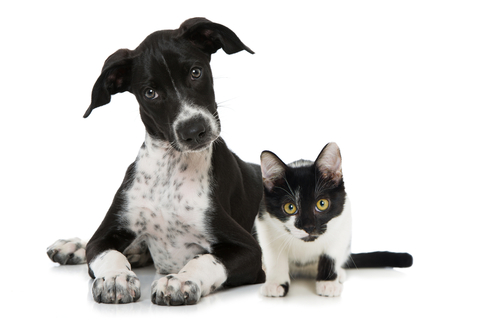
You can give your pet a beautiful coat with diet changes, supplements and conventional treatments prescribed by your veterinarian. Here are 5 tips for a better coat:
1) Make a visit with your veterinarian to discuss your pet's skin and coat concerns. Skin problems can be caused by a wide variety of issues including parasites, allergies, endocrine disorders (e.g. Cushings, thyroid), poor digestion, and bacterial infections. Be sure your cat or dog does not have fleas or other parasites. It is always a good idea to have your veterinarian check for parasites (both internally and externally) at least once a year. Parasites can greatly affect coat quality.
2) Take a look at your pet's diet. Many skin and coat problems are due to the pet's diet. For example, when pets have an allergy to the food, the allergic response can produce inflammation on their skin, causing itching, flaking and redness. Feeding a hypoallergenic, low carbohydrate, novel protein diet can be helpful for most pets with skin and coat problems. Depending upon the pet, novel proteins might include a protein like rabbit or venison. Many pets with skin and coat issues have allergies to common proteins like poultry and beef.
3) Watch the carbohydrates in your pet's diet. Avoiding allergens is the first step but if you are feeding a pet food that is very high in carbohydrates, that can promote yeast overgrowth causing odors, skin problems and ear infections. A lot of "hypoallergenic" and even liimited ingredient diets still contain grains (oats, rice, wheat, etc), vegetable flours, legumes (chickpeas) and other starches which, in excess, can promote yeast overgrowth. Ideally, including at least some raw frozen food in your pet's diet can be very helpful for allergies, digestion and skin and coat problems.
4) Add Omega 3s to your pet's diet. In addition to enhancing the coat and skin, they are helpful for allergies, joint support, brain function and so much more. You can use a combination of fish oil, flaxseed oil, cod liver oil and olive oil. Be sure to buy the highest quality, purified oils where contaminants such as PCBs and heavy metals have been removed. Pets that have dandruff and dry skin often are fed diets that lack omega-3 fatty acids. Omega-3 fatty acids can be added to your pet's diet by including fish in meals or by supplementing with fish oil. Please note: pet owners of cats or dogs having pancreatitis should consult a veterinarian before using any type of oil.
5) Keep a close eye on your pet’s digestive health. Many cats and dogs have digestive problems that can contribute to poor coat quality. Pets that have loose stool, vomiting, gas and tummy rumbling may not be digesting their food properly. As a result, critical nutrients needed to ensure a lustrous coat, are not being absorbed. How can you tell? Pets that are not benefiting enough from what they are eating, often have large, voluminous stools with partially-digested food.
